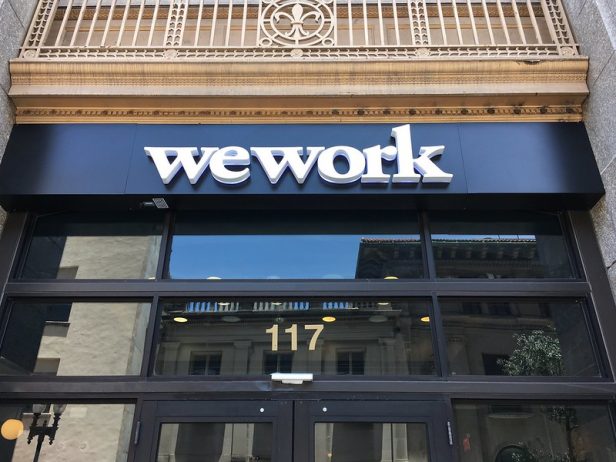
NEW YORK CITY – WeWork went from one of the world's fastest-growing start-ups to bankruptcy almost overnight as the co-working firm flicked its blinkers to change lanes to the public market through its flopped initial public offering. As the company's reputation slow burns, tech subsidiaries of the firm are aiming to buy themselves back or find new investors, highlighting how investors value profitability over scalability in the proptech sector.
Over the past two years, WeWork spent more than $500 million on tech-related companies with board approval and had acquired between 14 to 20 companies in total. Former CEO Adam Neumann, who later stepped down amid board pressure for shaky corporate governance, had been on a freewheeling spending binge, acquiring companies and other luxuries in excess, according to the firm's IPO prospectus.
The low-on-cash company nearly fell into bankruptcy had it not been for one of its biggest investors Softbank offering a $5 billion bailout. Now that the company is restructuring, including the sell-off of its subsidiaries, the proptech industry is watching as the story unfolds and deciding whether WeWork serves as a cautionary tale about risk-taking in the sector.
Among the first reported company to buy itself back from WeWork is the marketing platform Conductor that was acquired last Spring, and the buyer is not another company, but its own CEO and co-founder Seth Besmertnik, TechCrunch reported. Under the new structure, employees will own more than four times what they did when it sold the company, according to the article. "Our ownership model is going to really create an even more committed and even more passionate group of people as we apply that to our mission and vision," said CEO and co-founder Seth Besmertnik in the article.
In the Fall, WeWork announced it was going to sell technology companies Managed by Q and Meet-Up. Fast forward, the pair are in negotiations with potential buyers and will sell at a discount to the purchase price because WeWork stock used in the acquisitions are valued lower after its IPO debacle, which is why startups are circumspect when it comes to potential buyers in the first place.
"Startups are very cautious who to sell to, and want to make sure they'll be around for a long time and that their stock will go well if there is an IPO," Michael Beckerman, CEO of CREtech tells GlobeSt.com. "And if the company was brought with stock and the acquirer doesn't go public, it can create friction."
In 2019, ride-share companies Uber and Lyft and WeWork, which are venture-funded and about generating revenue and profits, demonstrated they were under pressure to have key performance indicators to show how effectively the companies were in achieving its business objectives because of their slow walk out of the bullpen in their IPO launches. Due to this fact, it has pressed upon earlier stage companies to come hard with a business plan, Beckerman said.
"Companies are working hard to get customers, onboarding and generating revenue," he said. "Early-stage companies, it's very hard to get funding. You got to have a great product and a strong customer acquisition strategy."
Seller's Remorse
With the proptech market watching WeWork subsidiaries divest, questions about who gets to be remorseful when an acquisition doesn't pan out as planned are stirring, in addition to questions about whether the co-working firm was hyperbolic or fraudulent in its representation to the acquired companies.
Acquired companies who relinquished their control to WeWork came from all sides of the spectrum, including some that were performing well, and those that were cash strapped, Zach Aarons, co-founder and partner at MetaProp, a proptech venture capital firm, tells GlobeSt.com.
"Whether you're selling to an imposter or the greatest business person on earth you're relinquishing control, you cannot be upset, you can't blame your board, acquirer, investors, you have to look at yourself in the mirror, which a hard thing to do," Aarons said, who sold an estimated eight companies to WeWork. "The person buying you talks about plans to grow excessively and is hyperbolic and not false, then you should know better and it is misplaced remorse."
After WeWork, where is proptech headed?
Venture capitalists in proptech weigh investments differently in the seed stage of a company versus its growth stage. And despite what happened with WeWork's flopped IPO launch and outstanding debt, there is still a risk-on attitude and desire to invest in proptech, according to Aarons.
"Investing in the seed-stage, I don't need you to be profitable until 5 to 7 years. If you're speaking to a growth stage venture capitalist there is a difference," he said. "The growth equity market is less tolerant of businesses becoming profitable, and need businesses profitable in two years than five years. As long as I believe the business plan works, I don't need the business profitable in two years."
However, the money has to come from somewhere, whether through a debt-equity raise or more venture capital money. Despite criticism from the market about WeWork and supposed red flags, he sees a great possibility for fast-growth companies with the potential to disrupt and secure end users. "I'd like to think I'd never do a deal with negative gross margins but it remains to be seen, but I don't know, I could make mistakes," he said.
© Touchpoint Markets, All Rights Reserved. Request academic re-use from www.copyright.com. All other uses, submit a request to [email protected]. For more inforrmation visit Asset & Logo Licensing.







